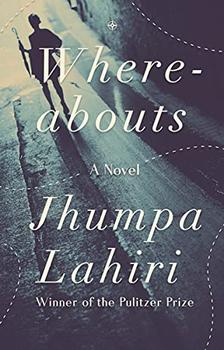Summary | Excerpt | Reviews | Beyond the book | Read-Alikes | Genres & Themes | Author Bio

A marvelous new novel from the Pulitzer Prize winning author of The Lowland and Interpreter of Maladies--her first in nearly a decade.
Exuberance and dread, attachment and estrangement: in this novel, Jhumpa Lahiri stretches her themes to the limit. The woman at the center wavers between stasis and movement, between the need to belong and the refusal to form lasting ties. The city she calls home, an engaging backdrop to her days, acts as a confidant: the sidewalks around her house, parks, bridges, piazzas, streets, stores, coffee bars. We follow her to the pool she frequents and to the train station that sometimes leads her to her mother, mired in a desperate solitude after her father's untimely death. In addition to colleagues at work, where she never quite feels at ease, she has girl friends, guy friends, and "him," a shadow who both consoles and unsettles her. But in the arc of a year, as one season gives way to the next, transformation awaits. One day at the sea, both overwhelmed and replenished by the sun's vital heat, her perspective will change.
This is the first novel she has written in Italian and translated into English. It brims with the impulse to cross barriers. By grafting herself onto a new literary language, Lahiri has pushed herself to a new level of artistic achievement.
Lahiri's protagonist is a moody storyteller, but it is the bitterness of her emotions that shocks her surroundings to life, and even her more anxious and disturbing thoughts contain a certain strange beauty. Buried in the novel's sparseness is a deceptively alive story that builds in momentum even as it offers little in the way of actual plot. Whereabouts reminds us that there is no escape from the confines and consequences of physical place and time, but its portrayal of these elements is cathartic, stimulating and satisfying...continued
Full Review
(557 words)
This review is available to non-members for a limited time. For full access,
become a member today.
(Reviewed by Elisabeth Cook).
Jhumpa Lahiri wrote her novel Whereabouts in Italian, a language she learned in adulthood, and later translated it into English. Many authors have at some time made the decision to become exophonic (to write in a language other than one's native tongue), whether for personal, artistic, practical or political reasons.
The author who is possibly best known for doing this is Irish writer Samuel Beckett, who famously adopted French in order to write "sans style" (without style). While he eventually returned to English, some of his most famous works were originally composed in French, including the play En attendant Godot (Waiting for Godot) and the trilogy of novels beginning with Molloy.
Hungarian writer Ágota Kristóf's short ...
This "beyond the book" feature is available to non-members for a limited time. Join today for full access.

If you liked Whereabouts, try these:

by Miranda July
Published 2025
The New York Times bestselling author returns with an irreverently sexy, tender, hilarious and surprising novel about a woman upending her life

by Jo Piazza
Published 2025
From bestselling author and award-winning journalist Jo Piazza, comes a transporting novel rooted in the author's own family history about a long-awaited trip to Sicily, a disputed inheritance, and a family secret that some will kill to protect ...